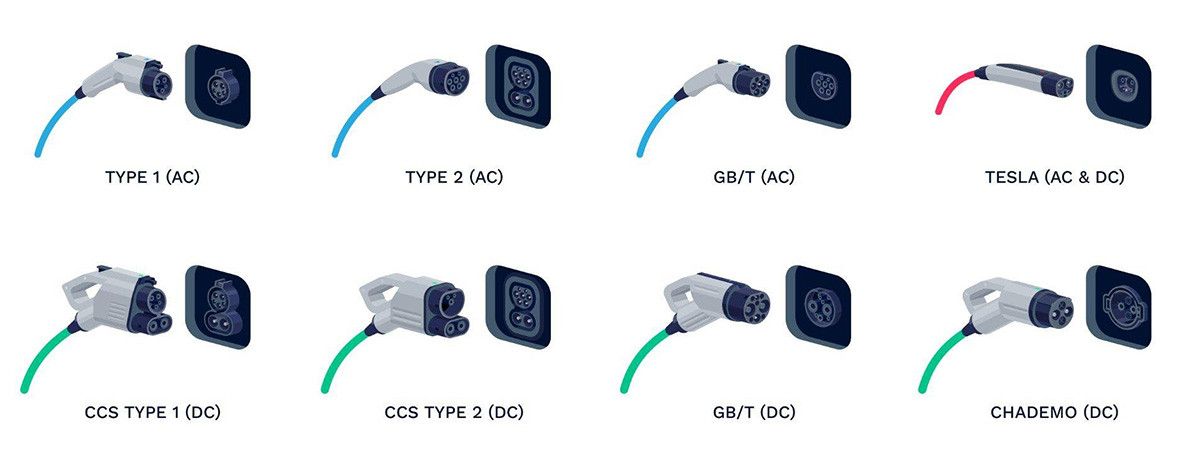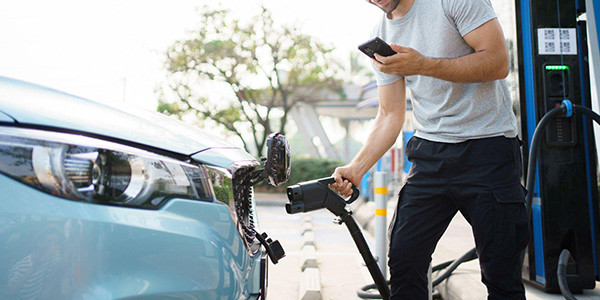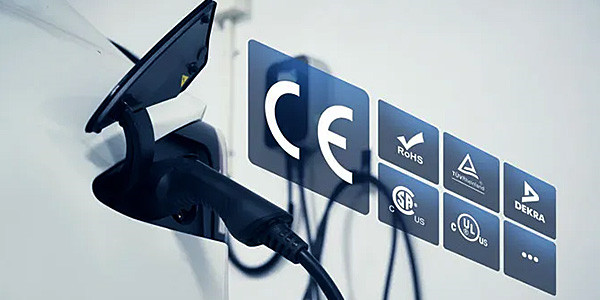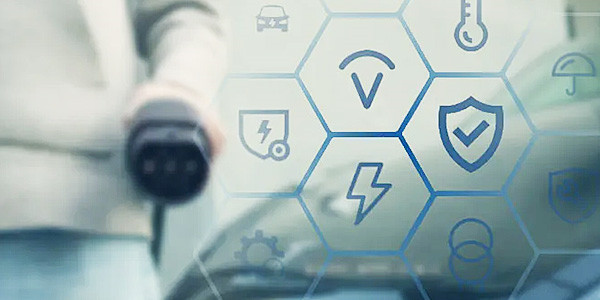EV charging connectors

Electric vehicles (EVs) are revolutionizing the automotive industry as sustainable and clean transportation options gain popularity. As the EV charging connector market grows, the need for efficient and standardized electric vehicle charging solution becomes increasingly crucial. This is where EV charging connectors play a vital role.
An EV connector is a physical interface that allows electric vehicles to connect with charging stations via a power cable. The EV charging connectors ensure a safe and reliable transfer of electricity from the grid to the vehicle, enabling efficient charging. A high-quality EV connector ensures compatibility between various vehicle models and charging infrastructures, creating a seamless charging experience for EV owners.
If you’re filling up a car that has an internal combustion engine (ICE), you only need to distinguish between the gas and diesel pump. For drivers of electric vehicles (EVs), however, there are more options to choose from. That’s because on the one hand, the nascent EV sector is still on a path to standardization, and on the other because different charging speeds and power loads require more than one type of EV plug. Here’s how to identify the right EV plug for the three types of electric vehicles (EVs) that require a plug-in charger, namely plug-in hybrids (PHEVs), battery electric vehicles (BEVs), and cars using proprietary chargers.
The Evolution of EV Plug Types
Travel around the world and you’ll soon realize that each country seems to have its own plug to connect devices to the power grid. If you want to use your devices abroad, you’ll typically need an adapter or even a transformer to draw power. The same lack of standardization applies to the EV market, both by fortune and design. EV car manufacturers developed vehicles before an internationally uniform charging infrastructure was in place, while certain manufacturers (eg. Tesla) intentionally developed proprietary solutions that supported their own vehicles only.
Understanding Different EV Plug Types
That’s how we reached the current landscape where EV plug types vary according to territory, power source (ie. slow vs. fast charging) and vehicle type.
Type 1 – SAE J1772
This is the standard for Level 1 and 2 charging in North America and Asia, where the source is a single-phase alternating current (AC). It’s a 5-pin plug that can draw power up to 19.2kW. In most cases, if you’re driving an EV in the USA, you connect to the home or public charging station using a Type 1 plug.
Type 2 – Mennekes
This is the standard in Europe where triple-phase alternating current is the default power source for Level 1 and 2 charging. The 7-pin plug allows up to 43kW and (unlike the Type 1) features an automatic locking mechanism to prevent accidental disconnection.
CCS1
You’ll need this 7-pin EV plug if you’re looking for DCFC charging (up to 350kW) in North America, although it can also be used for slow AC charging. Essentially, the CCS1 is a Type 1 plug with two additional high-speed DC charging pins added. If you’re charging at a public station, where the goal is usually to get back on the road with the briefest delay, this is the EV plug for the job.
CCS2
The European counterpart of the CCS1 is a 9-pin enhancement of the Type 2 plug. It allows charging of up to 350kW. As with the CCS1, this plug can deliver both AC and DC charging.
CHAdeMO
Initially developed in Japan, the 10-pin CHAdeMO was one of the first fast-charging DC plug types on the market. The first generation offered up to 50kW, but the second generation delivers a whopping 400kW. The CHAdeMO also allows for bidirectional vehicle-to-grid (V2G) charging. Despite its popularity in Japan, the plug is slowly being phased out internationally, particularly since the European Commission mandated CCS2 for DC charging in Europe.
GB/T
You won’t come across this EV plug as a North American driver, but it’s the option used by more than half of the world’s EV drivers. That’s because GB/T is the standard AC and DC plug in China, delivering 7.4kW for AC and 237.5 kW for DC.
Tesla Supercharger
Tesla’s proprietary EV plug accommodates Level 1, 2 and 3 AC and DC charging. In other words, there’s just the one plug. In North America, it uses a NACS charger, but all vehicles come with an adapter that connects to the Type 1 J1772 plug. In Europe, Tesla cars now use CCS2 charging.
EV charging connector types

Open Protocols and Interoperability
In recent years, the push for open protocols has gained momentum within the EV charging industry. Open protocols aim to establish a standardized, interoperable charging infrastructure that allows various plug types to seamlessly connect. That overcomes one of the key frustrations for drivers, and a significant obstacle where EV adoption is concerned. In February 2023, the US finally introduced new national standards for federally funded EV chargers to give drivers uniform consistency.
The Next Generation of EV Plugs
The Society of Automotive Engineers (SAE) International is pushing for the development of a wireless power transfer (WPT) charging solution in North America that will be equivalent to the J1772. Three charging speeds are currently in development:
WPT1 (max 3.7 kW)
WPT2 (max 7.7 kW)
WPT3 (max 11 kW)
Although wireless technology is still in the trial phase, it could be a regular feature as early as 2025. However, only one manufacturer in the US (BMW) currently offers a vehicle with wireless charging capability.

EV Charging Connectors
Gvtong Electronics has been working with electrical vehicles since 2010, helping the world connect to sustainable mobility through an EV charging inlet. Crucial child part assemblies and high endurance components are the focus for Gvtong Electronics. With our in-house R&D, we offer services starting from design, prototyping, sourcing, engineering, testing and expert after sales support. Gvtong Electronics is a leading player in the industrial electrical space, we offer the best EV charging connectors all over the world.
Reliable connectivity for next gen demands
Reduce connector failure in harsh environments and achieve 100% uptime.
Gvtong’s EV charging accessories are built using industrial-grade materials to withstand the abuse of motorists and the conditions of extreme heat, cold, and weather.
✓ PA66 fiberglass and thick wall design
✓ Rigorous testing processes
✓ Prevents water inundation, extreme dust, vibration or shock, reducing exposure to the elements
✓ Avoid heat loss and power waste during transfer

Complete Certification
Our charging accessories are backed by a wide range of certifications, including but not limited to ROHS, CCSAUS, TUV, UL, CE, and DEKRA. With this comprehensive certification coverage, you can trust in the quality, safety, and reliability of our products for your charging needs.
Safety Assurance
Rigorously tested for safety and reliability, our charging accessories feature built-in protections such as overload protection, short circuit protection, and temperature protection, ensuring secure charging operations.

Why Choose Gvtong for Your EV Charging Equipment Needs
Gvtong Electronics offers a comprehensive range of EV charging equipment manufacturing services. With 15 years experience in the industry, we have perfected the art of producing top-quality charging solutions. Whether it’s small-scale charging stations or large-scale infrastructure projects, we specialize in crafting reliable and efficient EV charging equipment.
Our product lineup includes connectors, cables, and more. Every component is manufactured to meet stringent quality standards, ensuring compliance with industry regulations such as ISO and SAE. Our clients trust us for our unwavering commitment to quality assurance.
For more information on Gvtong’s EV charging equipment manufacturing capabilities, reach out to us or request a quote today.
EV Charging Connector Manufacturer
With a group of highly professional technicians and operators, advanced manufacturing and inspection equipment, Gvtong’s EV charging connector (electric car plugs and charging sockets) is the best choice for your reliable, efficient, and cost-effective charging solution.
All EV charging connectors have built in safety features to protect against overcurrent, ground faults, overvoltage, and high temperatures. Thesesafety features protect the vehicle and the charging station, preventing electrical hazards. When using an EV charging station,it’s vtal to make sureyou follow all safety guidelines and use the correct charging connector for the electric vehicle.
The charging speed and power output of an EV charging conector are determined by several factors, including the connector type,the curent andvoltage of the charging station, and the capacity of the vehicle’s onboard charger. Each Ev connector has pros and cons, so understanding the diferent types of Ev charging connectors is essential.
